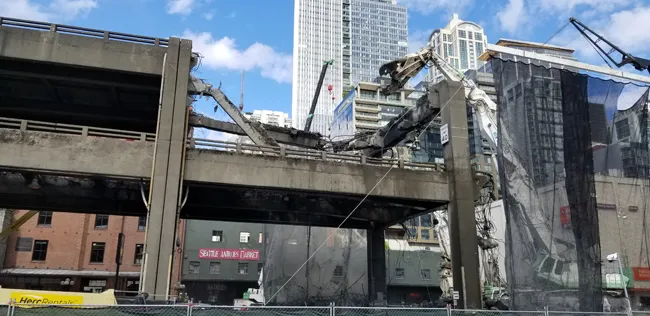
Demolition of the Alaska Way Viaduct in the northwest US city of Seattle in Washington State is underway, including the filling in of a redundant road tunnel.
Demolition contractor Kiewit Infrastructure West picked up the contract estimated at around US$94 million, according to media reports. Work is expected to take up to two years and includes filling in the Alaska Way’s Battery Street Tunnel.
For each segment of the viaduct, the contractor is removing the road decks, then girders and crossbeams and finally the support columns. During demolition, barriers are installed to protect nearby buildings and water is sprayed on the work to keep down dust.
Tunnel work includes decommissioning and removing the utility and mechanical systems, removal of hazardous material from the tunnel and, when finished, the sealing of the two entrances.
Kiewit decided against using conveyor belts to move the material into the Battery Street Tunnel. Instead, rubble is trucked to a nearby sorting area where rebar is removed. The material is crushed into small piece and loaded onto side-dumping trucks that carry the debris to openings along the tunnel route that lead directly down into the tunnel itself. The trucks dump the material into a steel funnel over the openings and down it goes into the tunnel. It takes less than a minute for the material to crash down into the tunnel where it is then levelled out by workers. Vibratory rollers spread and compact the material in layers.
Prior to the demolition work, there were public petitions to keep the Battery Street Tunnel open for pedestrian and bicycle use. However, the Washington State Department of Transportation decided that the structure, in need of repair, would have been extremely expensive to upgrade to modern seismic standards – an important feature for any structure along the west coast of the US and up into Canada. The region lies along the infamous San Andreas Fault making it prone to earthquakes.
The new Alaska Way’s tunnel lies directly under the old viaduct and was the subject of a World Highways Key Project Report in 2017.
<%$Linker:






